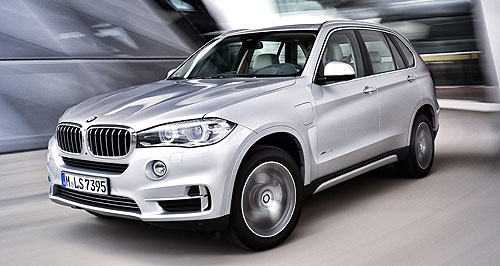Make / Model Search
News - BMWBMW wants electric tax incentivesPlugged in: BMW Group Australia executives are pushing for the luxury car tax to be dropped from environmentally friendly vehicles. Munich car-maker BMW leads charge for reduced emissions incentives7 Apr 2016 BMW Australia has renewed calls for incentives for low-emissions vehicles following increased government interest in the subject, with a company executive suggesting there is a “momentum” for change. Speaking at the national media launch for the X5 plug-in hybrid electric vehicle (PHEV) in Canberra this week, BMW Group Australia head of product and market planning Shawn Ticehurst said it was “ludicrous” that a vehicle with CO2 emissions of 79 grams per kilometre was hit with a 33 per cent luxury car tax (LCT) disincentive to buy. “It does seem ludicrous that a car like this (X5 PHEV) have a tax on it, whereas in other countries and some states of the US you actually have an incentive to buy it,” he said. “It is frustrating but our head office in Munich understands the situation.” Mr Ticehurst said that although he does not expect an immediate change in CO2 regulations in Australia, “the conversation is building momentum now and that leads to change”. “We don’t see it changing all of a sudden right now, but I feel there is a momentum about it being discussed a lot more,” he added. “I would hope that cars like this help drive that discussion around ‘why is there a tax on a car that is ultimately so good for our cities and our environment? Why tax the people buying it who are trying to help achieve that goal of improving our emissions standards?’“Cars like this, that go such a long way to lowering emissions, there should be some incentive and not a disincentive such as luxury car tax.” Mr Ticehurst said he does not expect the LCT to be abolished in the short term, however he added that one incentive that could be proposed is a reduced rate or abolition of LCT for low-emissions vehicles such as the X5 PHEV. Currently new vehicles that consume fewer than 7.0 litres per 100 kilometres attract a 33 per cent tax only if they are priced above $75,375. Thirstier vehicles attract the tax from $63,184. The X5 xDrive40e PHEV is rated at 3.3L/100km. In Australia it is identically priced, at $118,900 plus on-road costs, to an X5 utilising a diesel engine that emits 157g/km – almost double that of the petrol-electric variant. However, the diesel delivers more torque, is quicker and offers increased boot space. BMW Australia does not expect its plug-in hybrid electric vehicle to be as popular as its diesel equivalent. Both models pay $10,044 in LCT, however when asked if the removal of that fee would help increase the popularity of the X5 PHEV, Mr Ticehurst responded, “Yes”. “I think $10,000 would be a big incentive to people to say ‘I’ll consider it even more’ or others will say ‘wow that’s a smart buy to consider in the first place’,” he said, adding that “we certainly would” pass on the savings to the consumer. The national average of new vehicle CO2 emissions, based on data from VFACTS, stood at 184g/km in 2015, more than double the figure of the X5 PHEV and leaving Australia ranked 31st in the world for CO2 emissions tied with Mexico. European legislation demands each new vehicle manufacturer achieves an average of 130g/km which is mandated to fall to 99g/km by 2020. “This is one topic where we’ve got a long way to go here in Australia,” Mr Ticehurst said of Australia’s commitment to reducing C02 emissions. Locally, BMW Australia is well placed to argue for change as it already figures with the lowest average emissions of top new-vehicle manufacturers, tied with Audi at 149g/km. The local outpost of the Munich-based brand has welcomed the stakeholder engagement sessions initiated by the federal government to discuss with car-makers the viability of carbon dioxide (CO2) emissions targets for the road transport sector. A stakeholder engagement session was held in Canberra this week, at the invitation of federal minister for major projects, territories and local government Paul Fletcher, and federal environment minister Greg Hunt. Several manufacturers attended the meeting including representatives from Ford, Holden, Mazda, Mitsubishi, Toyota and Volkswagen, in addition to BMW Australia general manager corporate communications Lenore Fletcher. Asked whether a change from an Abbott to a Turnbull government has led the increased discussion in emissions targets, Mrs Fletcher replied, “I think that we have a different attitude from government at the moment, certainly.”“(This) is the next step of the government’s low-emission vehicle forum,” she added on Monday. “We’ll be going down to Mr Fletcher’s office along with many other members in the industry, looking at a target for Australia in terms of lowering emissions and a CO2 target. “It’s not something we haven’t been talking about for several years, we have been talking about it for a long time, but we are getting to the point where it looks like we may be able to get some results, which is fantastic.” As previously reported, in response to a wide-ranging discussion paper delivered in February, the federal government will accept formal replies from vehicle manufacturers, the Federal Chamber of Automotive Industries (FCAI) and the Australian Automobile Association (AAA) by April 8. It will hand down a draft report by June 30, followed by consultation on the draft regulation impact statements. A draft implementation plan for the reduction of road transport emissions in Australia is not, however, due to be released until March 31, 2017.  Read more |
Click to shareBMW articlesResearch BMW Motor industry news |












Facebook Twitter Instagram